
Training a Shih Tzu puppy is both a rewarding and challenging experience. These adorable, affectionate dogs are known for their friendly nature and loyalty, but their independent streak can sometimes make training a bit tricky. Proper training from an early age is essential to ensure that your Shih Tzu grows up to be a well-behaved and happy companion. In this comprehensive guide, we’ll cover the basics of Shih Tzu puppy training, from housebreaking to socialization, and everything in between. Whether you’re a first-time Shih Tzu owner or looking to refresh your training knowledge, this guide will provide you with the tools and techniques you need to succeed.
Understanding the Shih Tzu’s Personality and Temperament

Before diving into the training process, it’s important to understand the personality and temperament of the Shih Tzu. Shih Tzus are known for their affectionate and friendly nature. They thrive on human companionship and are often described as being “people dogs.” This strong bond with their owners makes them highly trainable, but their independent and sometimes stubborn nature can present challenges.
Shih Tzus are intelligent dogs, but they can be easily distracted. They may lose interest in training if it becomes repetitive or if they don’t see a clear benefit to obeying commands. Patience and consistency are key when training a Shih Tzu. Understanding their need for companionship and their tendency to get bored quickly will help you tailor your training approach to be both effective and enjoyable for your puppy.
Highlight: Patience and consistency are crucial when training a Shih Tzu due to their intelligent yet sometimes stubborn nature.
The Importance of Early Socialization
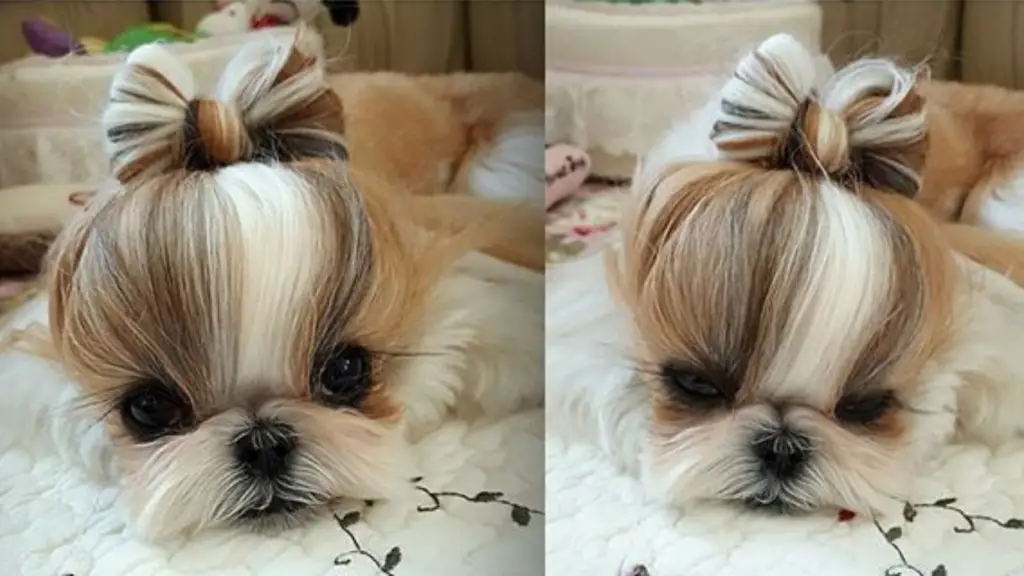
Socialization is a critical part of training any puppy, and Shih Tzus are no exception. Early socialization helps your Shih Tzu become comfortable in different environments, around various people, and with other animals. This exposure reduces the likelihood of developing fear-based behaviors or aggression later in life.
Start socializing your Shih Tzu as early as possible. Introduce them to different sights, sounds, and experiences in a controlled and positive manner. Take them on walks in busy areas, allow them to meet friendly dogs, and expose them to different types of people. Socialization should be a gradual process, ensuring that your puppy feels safe and secure at all times.
Highlight: Early socialization helps prevent fear-based behaviors and aggression, making it a crucial part of Shih Tzu puppy training.
Housebreaking Your Shih Tzu Puppy
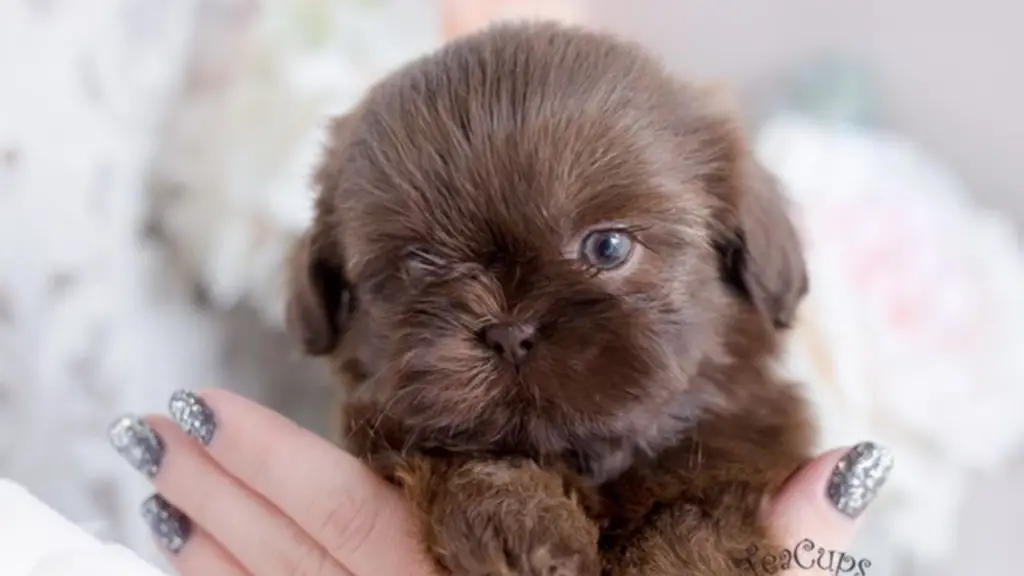
Housebreaking, or potty training, is one of the first and most important training tasks you’ll undertake with your Shih Tzu puppy. Due to their small size, Shih Tzus may have small bladders, which can make housebreaking a bit more challenging. However, with patience and consistency, your puppy can learn where and when to do their business.
Start by establishing a regular feeding schedule, as this will help regulate your puppy’s bathroom habits. Take your Shih Tzu outside frequently, especially after meals, naps, and playtime. Choose a specific spot for them to use as their bathroom area and take them there consistently. Use a command, such as “go potty,” to signal that it’s time to go. When your puppy successfully goes outside, praise them enthusiastically and offer a small treat as a reward.
Accidents will happen, especially in the early stages. When they do, clean them up thoroughly with an enzymatic cleaner to remove any lingering scent that might encourage your puppy to go in the same spot again. Never punish your Shih Tzu for accidents, as this can create fear and anxiety around potty training.
Highlight: Consistency in schedule and positive reinforcement are key to successfully housebreaking a Shih Tzu puppy.
Crate Training: Creating a Safe Space

Crate training is an effective way to provide your Shih Tzu puppy with a safe and secure space of their own. When done correctly, crate training can also assist with housebreaking and prevent destructive behavior when you’re not able to supervise your puppy.
Start by choosing a crate that is appropriately sized for your Shih Tzu. It should be large enough for them to stand up, turn around, and lie down comfortably, but not so large that they can use one end as a bathroom. Make the crate inviting by adding a soft bed or blanket and leaving the door open so your puppy can explore it at their own pace.
Introduce your puppy to the crate gradually. Begin by feeding them their meals near the crate, then inside the crate with the door open. Once they’re comfortable eating in the crate, close the door for short periods while they eat, gradually increasing the time they spend inside. Use positive reinforcement, such as treats and praise, to create a positive association with the crate.
Never use the crate as a form of punishment. The goal is for your Shih Tzu to see the crate as a safe and comforting space where they can relax. Over time, your puppy will likely seek out the crate on their own when they want to rest or feel secure.
Highlight: Crate training provides a safe space for your Shih Tzu and helps with housebreaking and preventing destructive behavior.
Basic Obedience Training: Teaching Commands
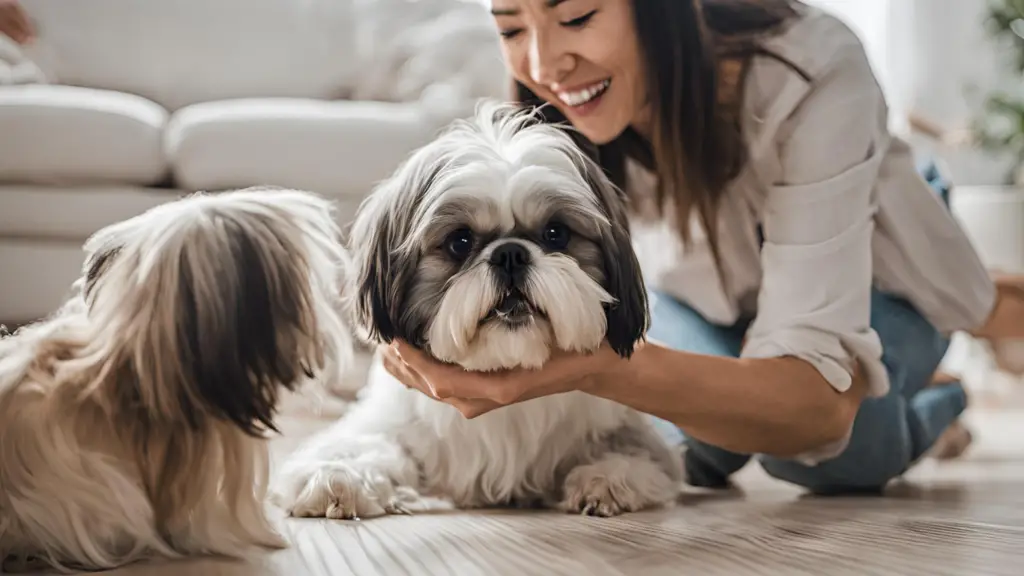
Basic obedience training is essential for your Shih Tzu’s safety and well-being. Teaching your puppy commands like “sit,” “stay,” “come,” and “leave it” will help you manage their behavior and keep them safe in different situations.
Start with simple commands like “sit.” Hold a treat close to your Shih Tzu’s nose, then move your hand upward, causing their head to follow the treat and their bottom to lower into a sitting position. Once they sit, say “sit,” give them the treat, and offer praise. Repeat this process several times a day until your puppy has mastered the command.
For commands like “stay,” start with your puppy in a sitting position. Hold your hand out in front of you, palm facing your puppy, and say “stay.” Take a step back, and if your puppy stays, reward them with a treat and praise. Gradually increase the distance and duration of the stay command as your puppy becomes more comfortable with the concept.
Consistency is key when teaching commands. Use the same words and hand signals every time, and always reward your Shih Tzu with praise and treats when they obey. Keep training sessions short and fun to maintain your puppy’s interest and prevent them from becoming frustrated.
Highlight: Consistency and positive reinforcement are essential when teaching your Shih Tzu basic obedience commands.
Leash Training: Teaching Your Shih Tzu to Walk Calmly
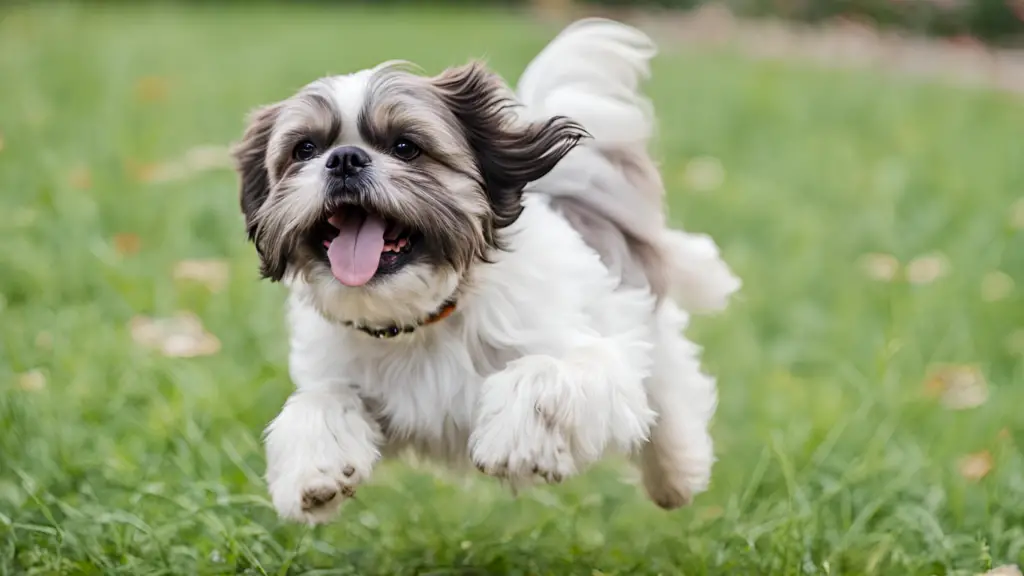
Leash training is an important part of your Shih Tzu’s overall training, as it ensures that walks are enjoyable and safe for both you and your puppy. Shih Tzus are small dogs, and it’s important to teach them to walk calmly on a leash to prevent pulling or darting into danger.
Start by introducing your puppy to their collar or harness and leash. Let them wear it around the house for short periods, allowing them to get used to the sensation. When your Shih Tzu is comfortable, begin practicing walking on the leash indoors in a distraction-free environment.
Hold the leash loosely and encourage your puppy to walk beside you. If they start to pull, stop walking and wait for them to return to your side before continuing. Reward them with treats and praise when they walk calmly beside you. Practice this consistently, gradually moving to outdoor environments with more distractions.
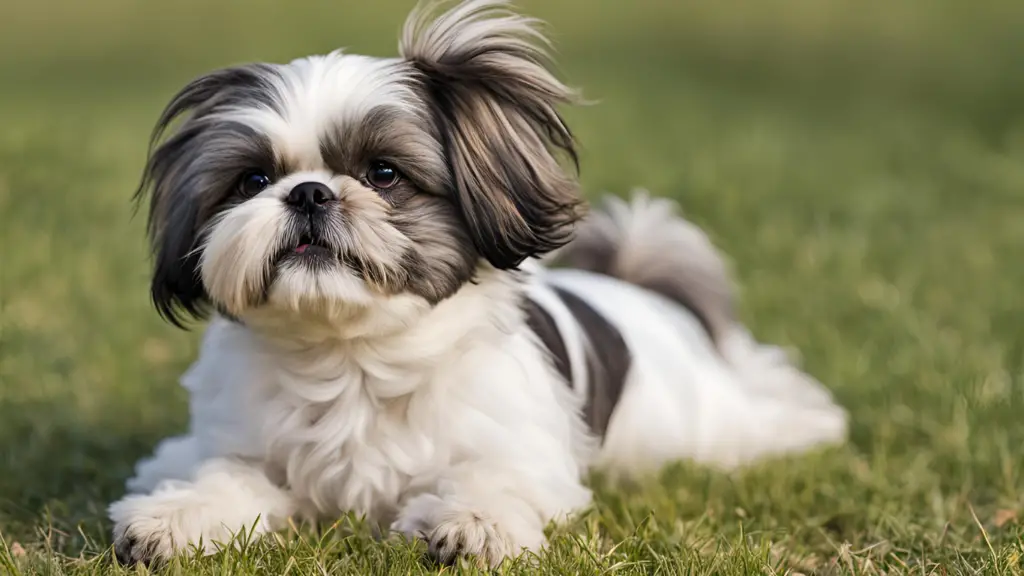
Avoid using retractable leashes, as they can encourage pulling and make it harder to teach your puppy to walk calmly. Instead, use a standard leash that gives you better control over your Shih Tzu’s movements.
Highlight: Leash training with a standard leash helps prevent pulling and ensures that walks are safe and enjoyable for both you and your Shih Tzu.
Socialization with Other Dogs and People
Socialization is not just about exposing your Shih Tzu to different environments, but also about helping them feel comfortable around other dogs and people. Proper socialization helps prevent behavioral issues like fear, aggression, and anxiety, and it contributes to your Shih Tzu’s overall happiness and well-being.
Introduce your Shih Tzu to other dogs in a controlled environment, such as a dog park or a friend’s house. Keep the initial interactions short and positive, gradually increasing the time your puppy spends with other dogs. Always supervise these interactions to ensure that they are safe and positive.
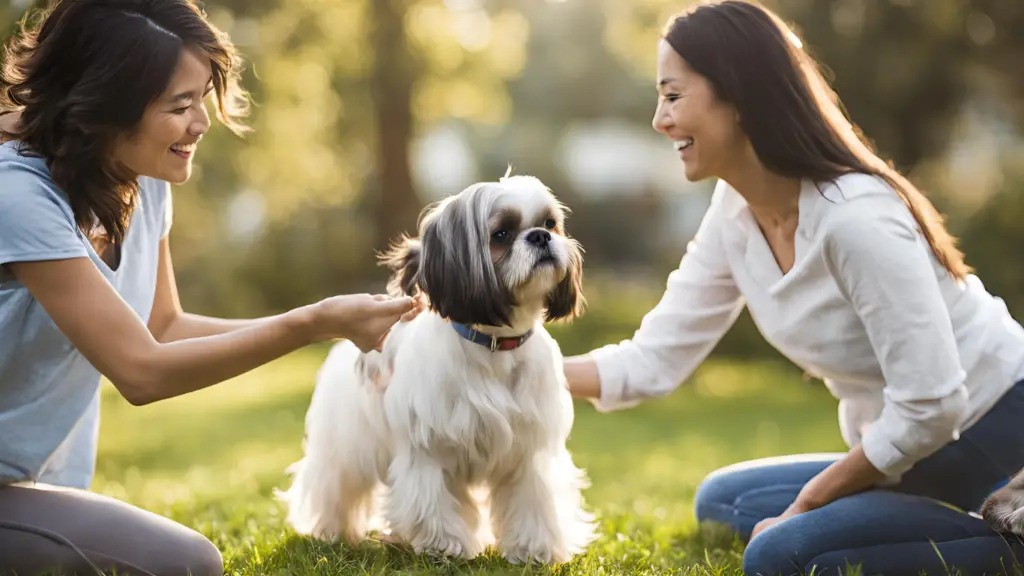
When introducing your Shih Tzu to new people, start with calm, gentle interactions. Allow your puppy to approach new people at their own pace, and reward them with treats and praise for positive interactions. Encourage visitors to offer treats and gentle petting to help build a positive association with meeting new people.
Socialization should be an ongoing process throughout your Shih Tzu’s life. Regular exposure to different dogs, people, and environments will help your puppy develop into a well-adjusted and confident adult dog.
Highlight: Ongoing socialization with other dogs and people helps prevent behavioral issues and contributes to your Shih Tzu’s overall well-being.
Addressing Common Behavioral Issues
Like all puppies, Shih Tzus may develop certain behavioral issues as they grow. Common issues include biting, barking, and separation anxiety. Addressing these issues early on with consistent training and positive reinforcement is crucial for preventing them from becoming ingrained habits.
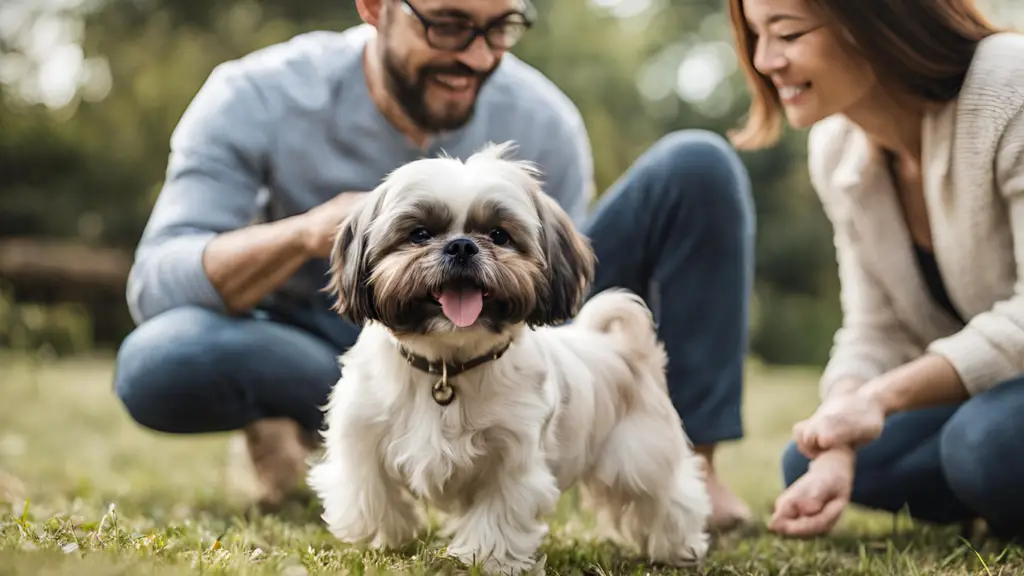
Biting: Puppies often explore the world with their mouths, but it’s important to teach them that biting is not acceptable behavior. When your Shih Tzu bites, immediately say “no” or “ouch” in a firm voice and stop playing or interacting with them. Offer a chew toy instead to redirect their biting behavior.
Barking: Shih Tzus can be prone to excessive barking, especially if they are bored or anxious. To address barking, identify the trigger and work on desensitizing your puppy to it. For example, if your puppy barks at the doorbell, practice having someone ring the doorbell repeatedly while you reward your puppy for staying calm and quiet.
Separation Anxiety: Shih Tzus are known for their strong attachment to their owners, which can sometimes lead to separation anxiety. To prevent this, gradually get your puppy used to being alone by leaving them for short periods and gradually increasing the time. Provide them with toys and treats to keep them occupied while you’re away, and avoid making a big fuss when you leave or return home.
Highlight: Addressing common behavioral issues like biting, barking, and separation anxiety early on is crucial for preventing them from becoming ingrained habits.
Positive Reinforcement: The Key to Effective Training

Positive reinforcement is the most effective and humane method of training a Shih Tzu puppy. This training method involves rewarding your puppy for desired behaviors, which encourages them to repeat those behaviors in the future. Rewards can include treats, praise, toys, or playtime.
When using positive reinforcement, timing is crucial. Reward your puppy immediately after they perform the desired behavior so they can make the connection between the behavior and the reward. Consistency is also important; everyone in the household should use the same commands and rewards to avoid confusing your puppy.
Avoid using punishment or negative reinforcement, as these methods can lead to fear, anxiety, and a breakdown in the bond between you and your puppy. Positive reinforcement builds trust and encourages your Shih Tzu to look forward to training sessions.
Highlight: Positive reinforcement is the most effective and humane method of training, building trust and encouraging desired behaviors in your Shih Tzu.
Establishing a Routine: Consistency is Key

Establishing a routine is essential for successful Shih Tzu puppy training. Puppies thrive on consistency and predictability, and a routine helps them understand what is expected of them. A consistent daily schedule for feeding, potty breaks, playtime, and training sessions will help your Shih Tzu feel secure and make the training process smoother.
Set specific times for feeding and stick to them as closely as possible. This will help regulate your puppy’s bathroom habits and make housebreaking easier. Schedule regular training sessions throughout the day, keeping them short and focused to maintain your puppy’s interest. Include playtime and exercise in your routine to keep your Shih Tzu physically and mentally stimulated.
Consistency also applies to the rules and boundaries you set for your puppy. If you don’t want your Shih Tzu on the furniture, make sure everyone in the household enforces this rule consistently. Mixed messages can confuse your puppy and make training more difficult.
Highlight: A consistent routine helps your Shih Tzu feel secure and makes the training process smoother and more effective.
The Importance of Mental Stimulation
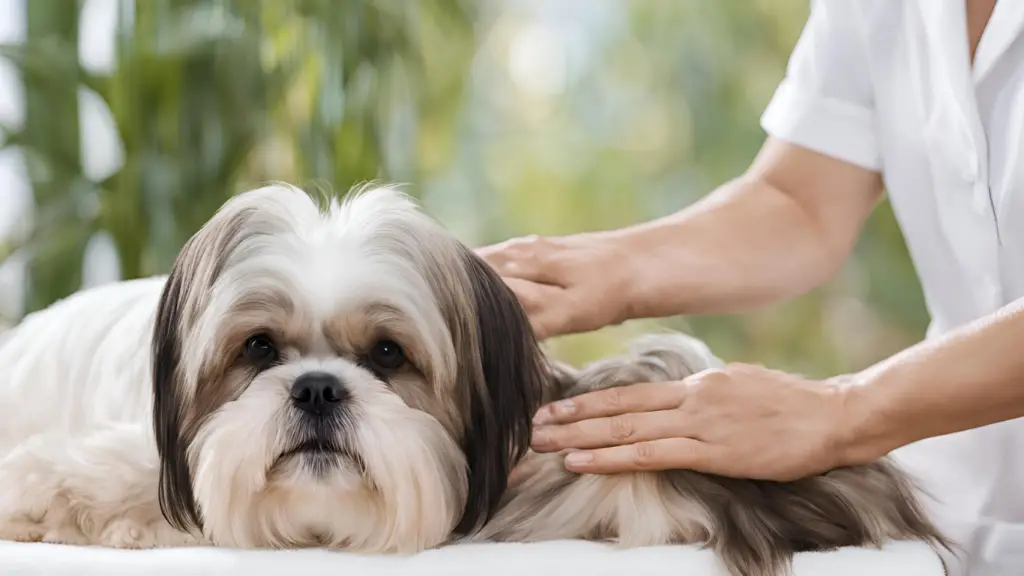
Shih Tzus are intelligent dogs that require mental stimulation to stay happy and well-behaved. Without adequate mental challenges, your puppy may become bored and develop behavioral issues such as chewing, digging, or excessive barking.
Incorporate mental stimulation into your Shih Tzu’s daily routine through interactive toys, puzzle feeders, and training games. Rotate toys regularly to keep things interesting, and introduce new challenges as your puppy masters the old ones. Training sessions themselves are a great way to provide mental stimulation, as they require your puppy to focus and think.
In addition to structured activities, allow your Shih Tzu time to explore their environment. Going for walks in new places, allowing them to sniff around, and giving them opportunities to investigate their surroundings are all mentally stimulating activities that can help prevent boredom.
Highlight: Mental stimulation is essential for keeping your Shih Tzu happy and preventing boredom-related behavioral issues.
Using Treats Wisely: Rewarding Without Overfeeding
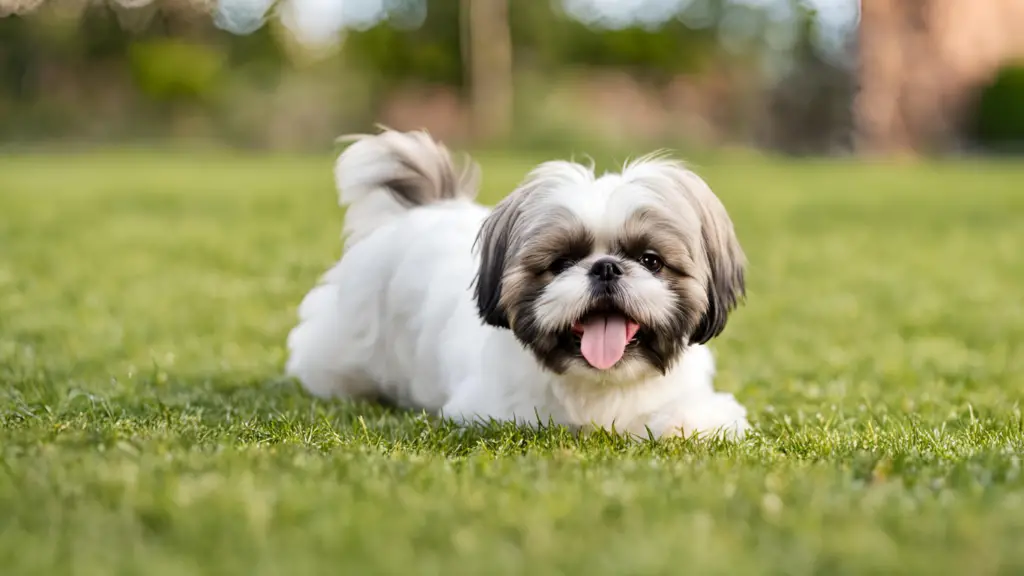
Treats are an important tool in positive reinforcement training, but it’s important to use them wisely to avoid overfeeding and potential weight gain. Shih Tzus are small dogs, and it doesn’t take much for them to consume too many calories, especially if they’re getting a lot of treats during training.
Choose healthy, low-calorie treats, and break them into small pieces to use during training sessions. You can also use your puppy’s regular kibble as a reward, especially if they are highly food-motivated. Keep in mind that rewards don’t always have to be food-based; praise, toys, and playtime can also be effective rewards.
As your Shih Tzu becomes more proficient in their training, gradually reduce the frequency of treats, and transition to rewarding them with praise or other non-food rewards. This will help prevent dependency on treats and maintain a healthy weight for your puppy.
Highlight: Use treats wisely during training to avoid overfeeding and potential weight gain, and gradually transition to non-food rewards.
Teaching Your Shih Tzu to Be Alone
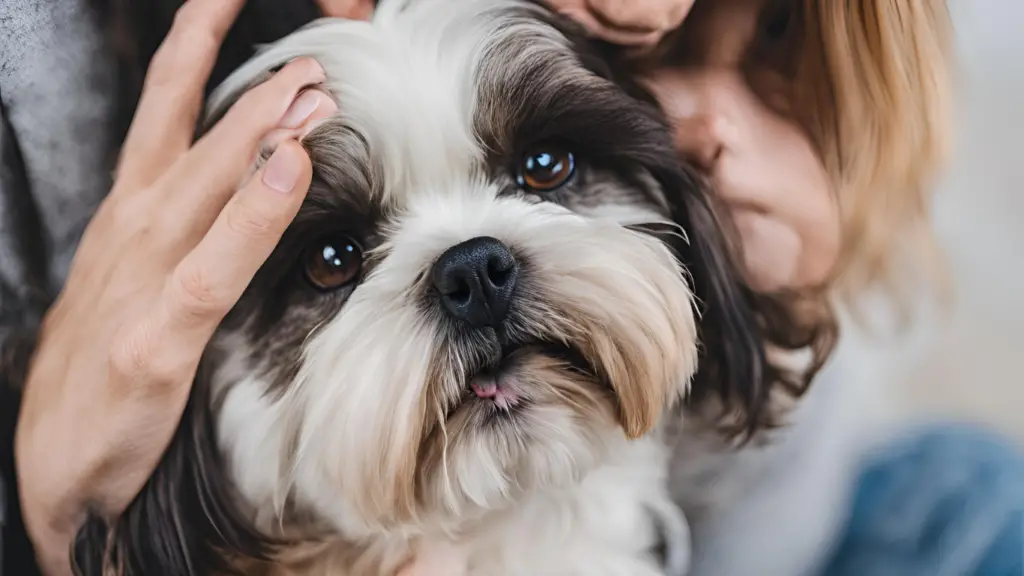
Shih Tzus are known for their strong attachment to their owners, which can sometimes lead to separation anxiety if they are not taught to be comfortable being alone. It’s important to teach your puppy that being alone is a normal part of life and that they can feel safe and secure even when you’re not around.
Start by leaving your Shih Tzu alone for short periods, even if you’re just in another room. Gradually increase the time you’re away, making sure to leave them with toys or a puzzle feeder to keep them occupied. Avoid making a big deal about leaving or returning home, as this can heighten anxiety.
If your Shih Tzu shows signs of distress when left alone, such as excessive barking, whining, or destructive behavior, it’s important to address these issues early on. Consider using a crate or a safe, confined space where your puppy can feel secure while you’re away. If separation anxiety persists, consult with a professional dog trainer or behaviorist for additional support.
Highlight: Teaching your Shih Tzu to be comfortable being alone is crucial for preventing separation anxiety and ensuring their well-being.
The Role of Exercise in Shih Tzu Training
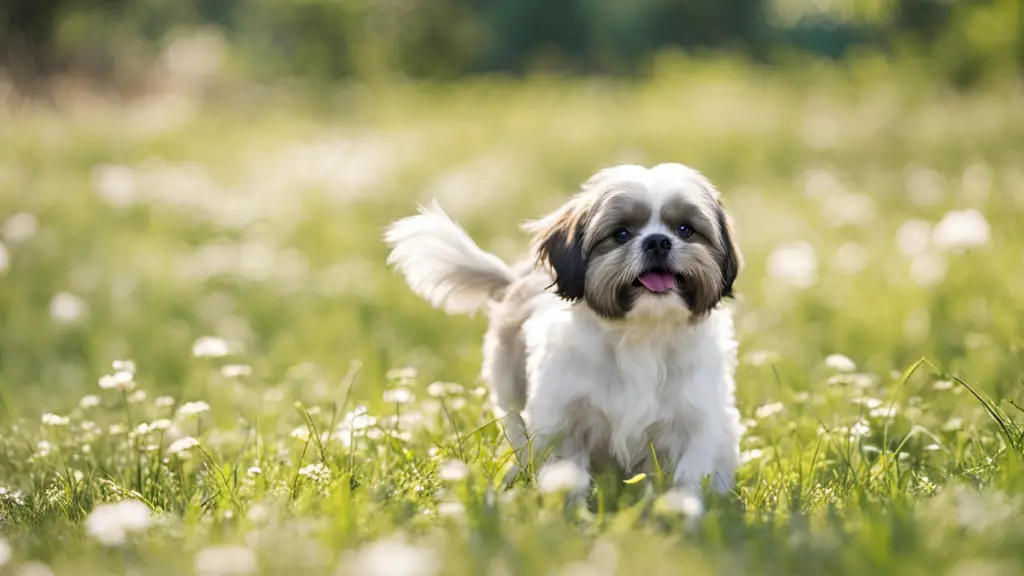
Exercise plays a vital role in the overall health and training success of your Shih Tzu puppy. Regular physical activity helps burn off excess energy, reducing the likelihood of behavioral issues such as chewing, digging, and excessive barking. Exercise also provides mental stimulation, which is important for keeping your puppy’s mind sharp and engaged.
While Shih Tzus are a small breed, they still require regular exercise to stay healthy and happy. Daily walks, playtime, and interactive games like fetch or tug-of-war are great ways to provide the physical activity your puppy needs. Be mindful of your Shih Tzu’s energy levels and adjust the intensity of exercise accordingly. Overexertion can lead to exhaustion or injury, especially in hot weather.
In addition to physical exercise, mental exercise is equally important. Incorporate training sessions, puzzle toys, and games that challenge your Shih Tzu’s mind into their daily routine. This will help prevent boredom and keep your puppy’s behavior in check.
Highlight: Regular exercise, both physical and mental, is essential for keeping your Shih Tzu healthy, happy, and well-behaved.
Understanding the Shih Tzu’s Grooming Needs
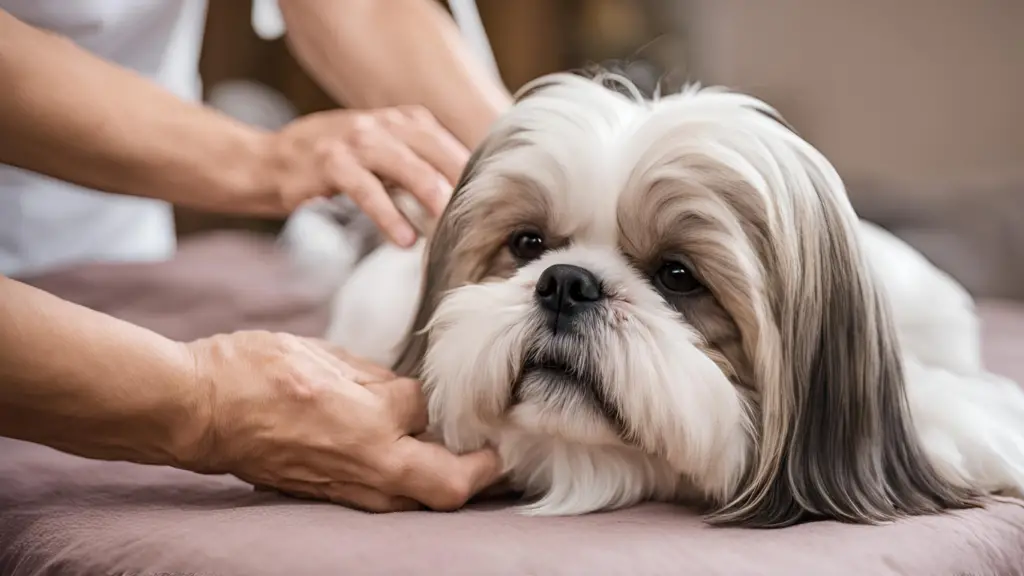
Grooming is an important aspect of Shih Tzu care and should be incorporated into your puppy’s training routine. Shih Tzus have a long, luxurious coat that requires regular brushing and grooming to prevent matting and keep their coat healthy. Starting grooming early will help your puppy become accustomed to the process and make it easier for you to maintain their coat as they grow.
Begin by introducing your Shih Tzu to grooming tools, such as a brush, comb, and nail clippers, in a positive and gradual manner. Allow your puppy to sniff and explore the tools before using them. Start with short grooming sessions, focusing on gentle brushing and handling your puppy’s paws, ears, and tail. Reward your puppy with treats and praise for staying calm and cooperative during grooming.
Regular grooming not only keeps your Shih Tzu looking their best but also allows you to check for any potential health issues, such as skin irritations, ear infections, or dental problems. Make grooming a positive experience by keeping sessions short, using gentle techniques, and rewarding your puppy for their cooperation.
Highlight: Regular grooming is essential for maintaining your Shih Tzu’s coat and overall health, and starting early will make the process easier for both you and your puppy.
Building a Strong Bond with Your Shih Tzu

Training is not just about teaching commands and behaviors; it’s also about building a strong bond with your Shih Tzu. A strong bond between you and your puppy will make training more effective and enjoyable, and it will lay the foundation for a lifelong relationship based on trust and respect.
Spend quality time with your Shih Tzu outside of training sessions. Engage in activities that your puppy enjoys, such as playtime, walks, or cuddling. Be patient and understanding, and always approach training with a positive attitude. Your Shih Tzu will pick up on your energy, and a positive, calm demeanor will help them feel more confident and secure.
Consistent, gentle, and positive interactions with your Shih Tzu will strengthen your bond and make training a rewarding experience for both of you. Remember that your puppy looks to you for guidance, and building a strong bond will help them feel safe, loved, and eager to learn.
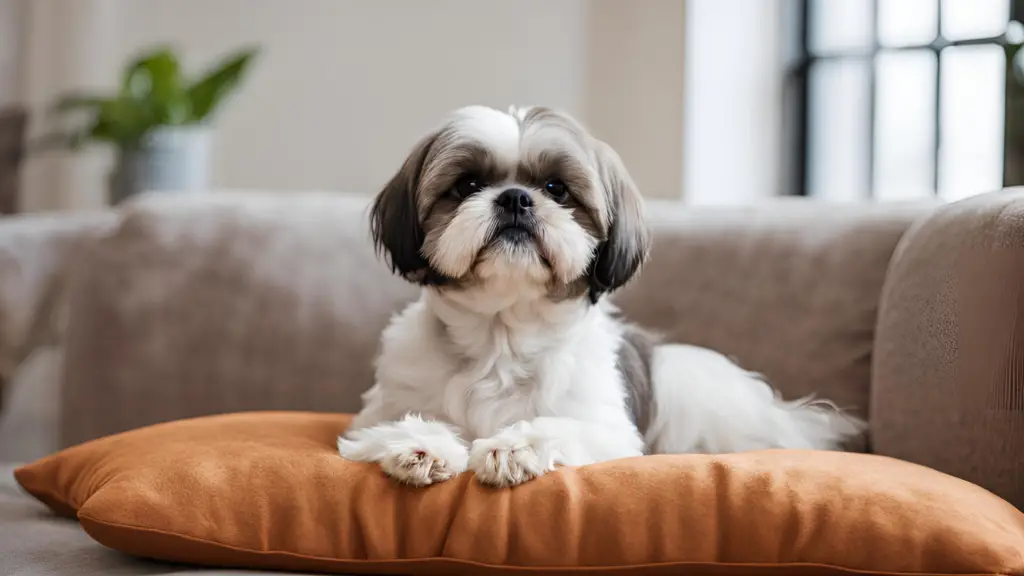
Highlight: Building a strong bond with your Shih Tzu is essential for effective training and lays the foundation for a lifelong relationship based on trust and respect.
The Benefits of Professional Training
While many Shih Tzu owners are successful in training their puppies at home, there are times when professional training can be beneficial. If you’re struggling with specific behavioral issues, or if you simply want additional support in training your puppy, enrolling in a professional training class can provide valuable guidance.
Professional trainers have experience with a wide range of dog breeds and behaviors, and they can offer personalized advice and techniques tailored to your Shih Tzu’s needs. Group classes also provide socialization opportunities, as your puppy will be exposed to other dogs and new environments, helping them become more well-rounded and confident.
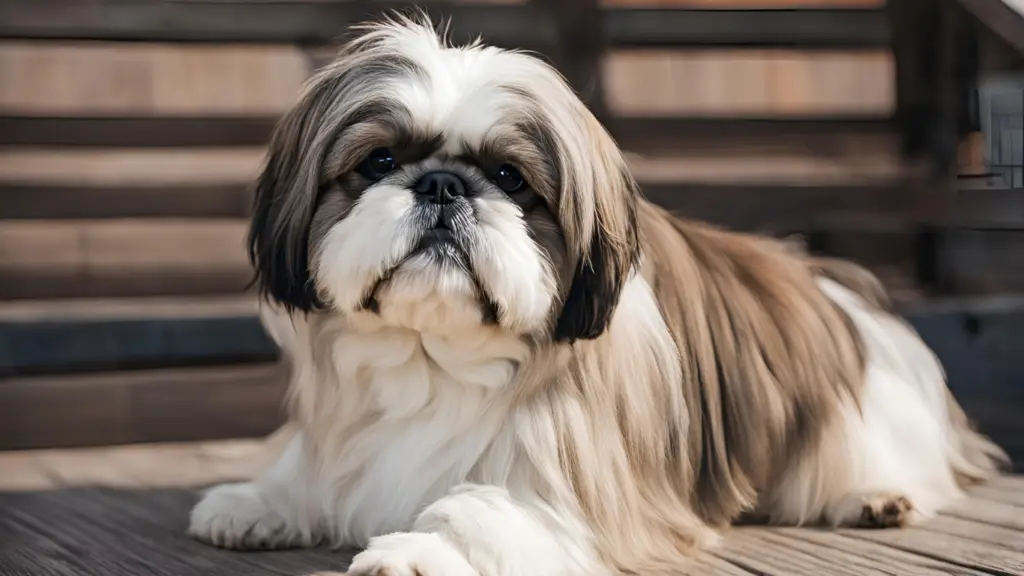
When choosing a professional trainer, look for someone who uses positive reinforcement methods and has experience working with small breeds like Shih Tzus. Attend a class or two before enrolling to ensure the trainer’s approach aligns with your training goals and philosophy.
Highlight: Professional training can provide valuable guidance, especially if you’re struggling with specific behavioral issues, and offers socialization opportunities for your Shih Tzu.
Conclusion
Training a Shih Tzu puppy is a rewarding and fulfilling experience that requires patience, consistency, and a deep understanding of your puppy’s unique needs. By focusing on the basics, such as socialization, housebreaking, and obedience training, and using positive reinforcement methods, you can help your Shih Tzu develop into a well-behaved and confident companion.
Remember that training is not a one-time event but an ongoing process that continues throughout your Shih Tzu’s life. Stay patient, keep sessions positive and fun, and always approach training with a calm and confident demeanor. With time, dedication, and love, you’ll build a strong bond with your Shih Tzu that will last a lifetime.


